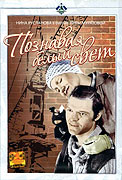Sinopsis(1)
The film tell a story of love triangle between plasterer Luba and two drivers Misha and Stepan, but through the agency of cinema language trivial love story transforms into passionate poem about love. Luba doesn't want to waste her time on a bumpy road, so she is learning by heart her text, prepared for a forthcoming Komsomol wedding tableful. Michail whirls the girls away from here and on the way Luba forgets her memorized speech, but learns how to be happy. (Moscow International Film Festival)
(más)Reseñas (1)
The main heroine between two men, Kira Muratova between two film worlds, and the Soviet Union between a muddy yesterday and a neat tomorrow. It is true that we can understand the script as Brezhnev idealization, but from the film itself, there is also a sense of resistance against any materialism in human relationships. Not only with typically Russian lyricism that I ever believed (and not condemned as kitsch) perhaps only in old Russian films. But it is mainly because of the central motto, the declaration of Ljuba, in which, among other things, says: "The most important thing in the world is true happiness. They don't produce it in factories, not even in the best ones." It is an antithesis of materialism and proof that the causality of the film does not meet the official communist ideology: in that transition - from the mud/bad relationship with Nikolay to the brand-new housing estate/great relationship with Mikhail - the soft piano literally screams to the viewer that Muratova sees this transition as caused by love itself, and not as something embedded in the concrete of material conditions. Mikhail is thus not a hero of socialist realism and historical materialism, but a lyrical hero who fell from somewhere from a different history (from a time when we did not fly into space but instead burned handmade ceramics). Love and happiness change us and our relationship to the world, not the other way around; there is no dialectic of both moments in the film, only a temporal synchrony of two internally unrelated motifs: the birth of love and the construction of a housing estate. That's why I give it one star less. /// Muratova, on the other hand, stands between two worlds - the film lyricism is balanced by her favorite formalistic games, here repetition, playing with the axis, and the camera.
()
Galería (4)
Foto © Moscow International Film Festival

